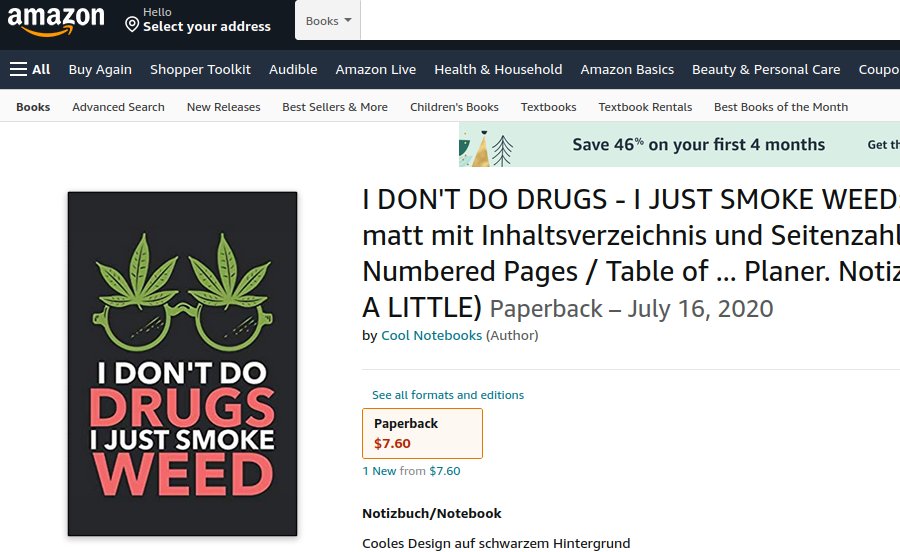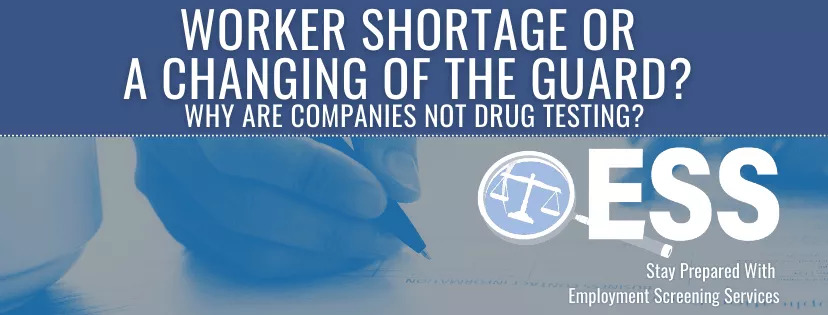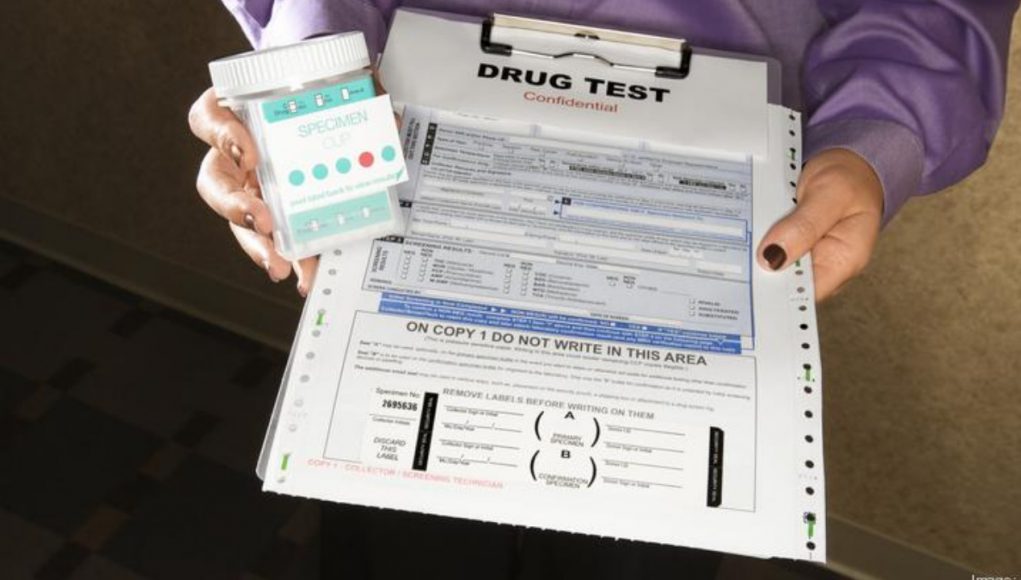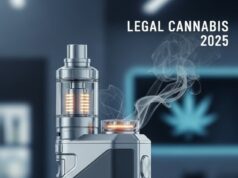There may come a time when future historians look back on the late-20th century and ask, “How did it become normal to hand in a cup of pee to an employer before you could secure a job?” We wonder that sometimes right now.
In the beginning was Reefer Madness, and Reefer Madness begat the insanely racist rhetoric of Henry Anslinger and the Federal Bureau of Narcotics. That begat cannabis on the Controlled Substances list, and the War on Drugs. By proxy, employers believed the hype and began drug screens on their own. Mind you, no federal law requires employers to screen for drugs; they just did it on their own.
We’ve pointed out before that there is a conflict between the legalization of cannabis and the continued policy of testing employee candidates for cannabis. Given that cannabis tests can go months and even years back to find cannabinoids in your system, you’d have to ask what good is it to legalize cannabis when you can’t get a job because you smoked one pre-roll over summer break?
But now a mighty wind o’ change is blowing, and tomorrow’s job applicant may finally have one less problem to worry about…

Amazon leads the way in ending pre-employment cannabis screening
Amazon, one of the largest employers in the United States, made quite a splash in the headlines this year with the announcement that they would no longer screen candidates for cannabis testing. Amazon CEO Dave Clark clarifies that this applies to positions that do not require driving. The company will continue to do impairment checks on the clock and after incidents.
Clark (Bezos stepped down as Amazon CEO in July 2021) indicates that the changing state laws drive Amazon’s choice in ending mandatory cannabis screens for all employee applicants. Considering that they employ 16K people in Colorado alone, one of the first states to legalize, you can see their point.
Amazon has since doubled-down on their stance, urging contracted companies to also end cannabis screening for applicants. That story has since had a head-on collision (sorry) with the COVID-19 pandemic story: A worldwide labor shortage that is threatening the global supply chain.
Say what you will to explian this situation: It’s due to COVID deaths and those whose lives are irreparably changed, it’s due to greedy employers who won’t pay employees their fair share, it’s due to people just depressed and discouraged and paranoid during a global plague. But the bottom line is, if you have a job opening right now, you’ll take just about any warm body that walks in the door, without caring if they dabbed an extract last night.

Other companies follow suit ending pre-employment cannabis screening
Vice reporters spell it out clearly: “Companies are Getting Rid of Drug Tests Because They Can’t Find Enough Workers.” Unnecessary drug tests just uselessly block candidates out of an already small talent pool. This is not confined to the United States, but also to the UK, Canada, and Australia.
The NBA has also suspended cannabis screening of players. Now sports and recreation is one story, but major banking firms are also ending cannabis screening. This new policy is explained when you consider that most of the US banking corporations are headquartered in New York, which has recently gone legal. Finally we have the most triumphant blow to strike down pre-employment cannabis screening, there is “Phynally,” a search engine for finding jobs that don’t require cannabis testing. “We are the Linked-In for cannabis users,” the CEO proudly announces.

Laws banning cannabis screening as an employment condition
Now we’re seeing the tail wagging the dog: Government steps into the issue for the first time with an Illinois bill which seeks to make it illegal to screen or fire employees for cannabis use. If that sounds like a radical step, Philadelphia has already passed a law banning cannabis pre-employment screens. The same can be said in New York, which has also banned cannabis drug screening for most positions. Nevada, a state with one of the most rocking cannabis scenes in the country, has also outlawed pre-job cannabis screening. Even way up in Maine, which barely has a legal market at all yet, employers are already banned from cannabis testing.

Is weed use THAT impairing anyway?
Even though we’re a cannabis review and consumer advocacy site, we’re going to go overboard and say that cannabis is not an impairing substance at all. You still shouldn’t drive stoned, OK? We don’t want air traffic controllers and brain surgeons out there stoned. Of course not.
But for most service-level jobs that don’t involve driving or operating heavy equipment, do we really care that much? Readers, are you comfortable with the checker at the grocery store or the waiter at the restaurant blazing up on break? From what we’ve seen of many service-level jobs, they’re not so demanding that you need every brain cell to perform your duties.
In some cases, some cannabis use may even be a benefit. Remember that there’s more to cannabis than just getting stoned anymore. I’ve noted before that some strains without heavy THC content, but substituting delta 8 or CBG, even help increase alertness, making you feel less drowsy.
Consider also that this has no impact on prohibiting cannabis use on-the-job. Most companies will still restrict that, and most of us don’t have a problem with it. But pre-employment cannabis screening means you can’t even indulge on your off-time. You can legally get sloppy drunk and come in the next day with a hangover that would make Dionysus cry, but cannabis, with almost no traces of a hangover effect, is prohibited.
Readers, what do you think?
We wanted legalized cannabis and we’re finally getting it. Are we now prepared to enter a post-prohibition world where your cook, museum guide, newscaster, and basketball player is a regular stoner? Share your thoughts in the comments below or in our highly permissive forum.














Advanced Raydium Launchpad volume bot with professional Solana trading automation.
Casibom 827 Casibomn 827
Thank you
Good post! We will be linking to this particularly great post on our site. Keep up the great writing
Thanks for Sharing
Thanks
Thanks
Really inspiring.
Well written!
Perfectly explained.
So relatable.
Thanks
Thank For Sharing
Thanks for sharing
Your writing is so eloquent and heartfelt It’s impossible not to be moved by your words Thank you for sharing your gift with the world
Thanks for sharing
Good job bro
Good Job Bro
Thanks for sharing
Thanks for sharing
Thanks for sharing
Thanks for sharing
Amazing post
Thanks for sharing
Amazing post
Thanks for sharing
Amazing post
Amazing post
Thanks for sharing
Amazing post
Good Job Bro
From start to finish, your content is simply amazing. You have a talent for making complex topics easy to understand and I always come away with valuable insights.
thank you for everything
Thank you bro
PumpVolume PRO is the most advanced and reliable Pump.fun volume bot designed to help crypto developers and token creators trend to the #1 spot on Pump.fun with fully undetectable, organic-looking trade activity.
Give a round of applause in the comments to show your appreciation!
Turkiye de en cok tercih edilen casibom markasi sizinle.
Binlerce oyun arasindan dilediginizi secerek bahis oynamanin keyfine varabilirsiniz. Casibom oyunlari size yeter.
This isn’t a promotional post by the team or a paid ad. It’s my genuine experience using the platform, and why I believe it’s currently the best Solana token volume bot for creators who are serious about growth.
Solana Volume Bot is an advanced automated trading tool tailored for the Pump.fun platform on the Solana blockchain. Designed to boost token trading volume and achieve trending status, this bot is revolutionizing visibility for crypto projects. With its seamless UI, high-speed execution, and strategic automation, it provides a cutting-edge solution for web3 developers and meme coin creators.
In this comprehensive guide, we’ll explore how Solana Volume Bot works, its key features, user experience, and a step-by-step guide to launching your first volume campaign.
If you are looking for a solution to create a Cheap Openbook Market ID you might be a bit confused. In this article you can learn how to create a market id in seconds with Openbookv2 for only 0.2 SOL.
Are you ready to launch your own cryptocurrency without writing a single line of code? Thanks to powerful no-code platforms like ERC20 Maker, you can now create and deploy your very own ERC-20 token on the Ethereum blockchain for as little as 0.01 ETH — all within minutes.
In this article, we’ll look at how to automate trading on Solana and profit from meme coin projects in particular. If you want to make profitable trades on meme coin platforms like Pump.fun and Moonshot, you almost certainly need a successful automation program. These automation programs, which go by names like Solana Sniper Bot, have a very simple working principle and should not cause confusion most of the time.
Launching a token on Pump.fun is just the beginning — getting it noticed and trending requires smart strategy, not just luck. In a competitive ecosystem like Solana, where thousands of new tokens emerge daily, visibility is the key to success. This is where using a Pump.fun volume bot becomes not just helpful, but absolutely essential.
Hi there to all, for the reason that I am genuinely keen of reading this website’s post to be updated on a regular basis. It carries pleasant stuff.
Drop a link to your favorite blog post of yours in the comments below, I’d love to read more.
There is definately a lot to find out about this subject. I like all the points you made
This was beautiful Admin. Thank you for your reflections.
Konya ikinci el eşya alanlar 2. el eşya alımı satımı yapmakta olan firmamız eşyalarınızı yerinde görerek alıyoruz.
yabancı dizi ve film izleme siteleri, geniş bir içerik yelpazesi sunarak kullanıcıların farklı türlerdeki yapımları izlemelerine olanak tanır. Bu tür platformlar, popüler dizilerden klasik filmlere kadar çeşitli seçenekler sunarak izleyicilere zengin bir deneyim sağlar.
I admire how this blog promotes kindness and compassion towards ourselves and others We could all use a little more of that in our lives
Very well presented. Every quote was awesome and thanks for sharing the content. Keep sharing and keep motivating others.
Good post! We will be linking to this particularly great post on our site. Keep up the great writing
For the reason that the admin of this site is working, no uncertainty very quickly it will be renowned, due to its quality contents.
This is really interesting, You’re a very skilled blogger. I’ve joined your feed and look forward to seeking more of your magnificent post. Also, I’ve shared your site in my social networks!
I truly appreciate your technique of writing a blog. I added it to my bookmark site list and will
Nice post. I learn something totally new and challenging on websites
For the reason that the admin of this site is working, no uncertainty very quickly it will be renowned, due to its quality contents.
naturally like your web site however you need to take a look at the spelling on several of your posts. A number of them are rife with spelling problems and I find it very bothersome to tell the truth on the other hand I will surely come again again.
I like the efforts you have put in this, regards for all the great content.
Good post! We will be linking to this particularly great post on our site. Keep up the great writing
This is really interesting, You’re a very skilled blogger. I’ve joined your feed and look forward to seeking more of your magnificent post. Also, I’ve shared your site in my social networks!
Awesome! Its genuinely remarkable post, I have got much clear idea regarding from this post
I’m often to blogging and i really appreciate your content. The article has actually peaks my interest. I’m going to bookmark your web site and maintain checking for brand spanking new information.
There is definately a lot to find out about this subject. I like all the points you made
Nice post. I learn something totally new and challenging on websites
Hi there to all, for the reason that I am genuinely keen of reading this website’s post to be updated on a regular basis. It carries pleasant stuff.
very informative articles or reviews at this time.
Awesome! Its genuinely remarkable post, I have got much clear idea regarding from this post
Nice post. I learn something totally new and challenging on websites
I’m often to blogging and i really appreciate your content. The article has actually peaks my interest. I’m going to bookmark your web site and maintain checking for brand spanking new information.
I appreciate you sharing this blog post. Thanks Again. Cool.
I’m often to blogging and i really appreciate your content. The article has actually peaks my interest. I’m going to bookmark your web site and maintain checking for brand spanking new information.
beylikdüzü escort
porno
cleaning ladies who clean houses
Kore dizileri, son yıllarda dünya genelinde büyük bir popülerlik kazandı. Türk izleyicileri de bu dizilere yoğun ilgi gösteriyor. Özellikle Türkçe dublaj seçenekleri, Kore dizilerini daha anlaşılır ve rahat izlenebilir kılmaktadır. Türkçe dublajlı Kore dizileri, dil bariyerini ortadan kaldırarak izleyicilere kültürel bir zenginlik sunuyor.
Ankara Demetevler Yenimahalle Bölgesinde Diş Hekimi Arıyorsanız Orkun Ersan Tokmakçı Diş Hekimi Aradığınız Dişçi Sizlerede Kesinlikle Tavsiye Ederiz.
Ankara Demetevler Yenimahalle Bölgesinde Diş Hekimi Arıyorsanız Orkun Ersan Tokmakçı Diş Hekimi Aradığınız Dişçi Sizlerede Kesinlikle Tavsiye Ederiz.
Erotik filmler, cinsel temalar üzerinden insan ilişkilerini ve arzuları keşfeder. Bu tür sinema, izleyicinin duygusal ve fiziksel deneyimlere dair farklı bakış açıları geliştirmesine yardımcı olabilir. Sanatsal bir dil ve estetik anlayışla yapılan bu yapımlar, bazen toplumsal normlara karşı eleştirel bir yaklaşım sergileyebilir.
Ankara Demetevler Yenimahalle Bölgesinde Diş Hekimi Arıyorsanız Orkun Ersan Tokmakçı Diş Hekimi Aradığınız Dişçi Sizlerede Kesinlikle Tavsiye Ederiz.
gerçekten güzel bir yazı olmuş. Yanlış bildiğimiz bir çok konu varmış. Teşekkürler.
Your writing is so inspiring and motivating I always leave your blog feeling more determined and resilient
Your writing style is so relatable and authentic It’s a breath of fresh air in a world filled with superficiality and pretense
I’ve learned a lot from this post. Looking forward to more insightful articles
This is exactly what I needed to read today. Thank you for the valuable tips
Yenimahalle Demetevler Batıkent En İyi Diş Hekimi Kliniği O.E.T Ağız ve Diş Sağlığı Merkezi Sizlere Hizmet Veriyor.
Your writing style is engaging, and the content is top-notch. Keep posting
çok başarılı ve kaliteli bir makale olmuş güzellik sırlarım olarak teşekkür ederiz.
En kaliteli içerikler
Casinova’ya üye olmak için genellikle sitenin ana sayfasında bulunan “Kayıt Ol”, “Üye Ol” veya benzeri bir butona tıklamanız gerekir. Karşınıza çıkan kayıt formuna adınız, soyadınız, e-posta adresiniz, telefon numaranız, doğum tarihiniz gibi kişisel bilgilerinizi ve hesabınız için bir kullanıcı adı ile şifre girmeniz istenir. Bilgilerin doğru ve eksiksiz olması önemlidir.
Fantastic read! Your explanations are clear and easy to understand
Awesome! Its genuinely remarkable post, I have got much clear idea regarding from this post
Ankara Demetevler Yenimahalle Bölgesinde Diş Hekimi Arıyorsanız Orkun Ersan Tokmakçı Diş Hekimi Aradığınız Dişçi Sizlerede Kesinlikle Tavsiye Ederiz.
I appreciate how this blog promotes self-growth and personal development It’s important to continuously strive to become the best version of ourselves
Atasehir bölgesinde ev arayisiniz var ise, sizlere atasehirsatilik.com sitesini kesinlikle öneririm. Satilik Daire, Dükkan, Arsa ve Ofis imkanlari ile Atasehir bölgesinde profesyonel emlak hizmeti saglamaktadir.
Atasehir bölgesinde ev arayisiniz var ise, sizlere atasehirsatilik.com sitesini kesinlikle öneririm. Satilik Daire, Dükkan, Arsa ve Ofis imkanlari ile Atasehir bölgesinde profesyonel emlak hizmeti saglamaktadir.
Your website is a great resource! I always enjoy reading your articles
Nice post. I learn something totally new and challenging on websites
bahçelievler bölgesinde ücretsiz su çekimi yapıyoruz arayın görüşelim. şirinevler ücretsiz su çekimi, bahçelievler bedava su çekimi, yayla belediye su çekimi, kocasinan belediye ücretsiz su çekimi numarası belediye ücretsiz su çekimi
Your writing style makes even complex topics easy to understand. I love how well-structured and engaging your posts are
En popüler ve en çok izlenen yabancı dizileri tek bir platformda keşfedin. Aksiyon, dram, komedi, bilim kurgu ve daha fazlası – dilediğiniz türde kaliteli yapımları Türkçe altyazılı veya dublaj seçenekleriyle izlemeye başlayın. Yeni bölümlerden haberdar olun, favori dizilerinizi kaçırmayın!
Fantastic read! Your explanations are clear and easy to understand
Betmarket giriş platformunun altyapısında kullanılan teknolojiler, kullanıcıların dijital ortamda yaşadığı engelleri minimize edecek biçimde tasarlanmıştır.
Your website is a great resource! I always enjoy reading your articles
أهمية استخدام VPN على ويندوز
ما هو Windows Credential Manager وكيفية استخدامه
I always recommend this site to my friends. Great job on the content
You have a way of explaining complex topics in a straightforward and easy to understand manner Your posts are always a pleasure to read
This website has become my go-to source for reliable information. Keep up the great work
I really like reading through a post that can make men and women think. Also, thank you for allowing me to comment!
From the bottom of my heart, thank you for being a source of positivity and light in this sometimes dark and overwhelming world
This is really interesting, You’re a very skilled blogger. I’ve joined your feed and look forward to seeking more of your magnificent post. Also, I’ve shared your site in my social networks!
Pretty! This has been a really wonderful post. Many thanks for providing these details.
I appreciate you sharing this blog post. Thanks Again. Cool.
Kingroyali’nde turnuvalar çok kazançlı.
I just like the helpful information you provide in your articles
Great article! The insights you provided are really helpful. Keep up the good work
Spor Habeleri,Güncel Haberler, Sondakika Haberleri
dizimag farkıyla full hd film izlemek için sitemize bekleriz.
I stumbled upon this site recently, and I must say, the quality of articles here is outstanding. Great job
Dizimag farkıyla full hd 1080p donmadan yabancı dizi izle izle ve indir.
Spor Habeleri,Güncel Haberler, Sondakika Haberleri
Spor Habeleri,Güncel Haberler, Sondakika Haberleri
I stumbled upon this site recently, and I must say, the quality of articles here is outstanding. Great job
Kingroyal yeni giriş ile kesintisiz hizmet alabilirsiniz.
Hocam Ellerinize Sağlık, köpek oteli ve pet otel hakkında Detaylı ve Güzel Makale Olmuş.
Özellikle başlangıç seviyesindeki kişiler için çok iyi bir kurs. Korkumu yenip rahatça yüzmeyi başardım.
I admire the dedication to providing well-researched and accurate content. This site has quickly become one of my favorites
Bilgiler için teşekkür ederim işime son derece yaradı
Spor Habeleri,Güncel Haberler, Sondakika Haberleri
Batıkent Yüzme Kursu’nda su altı teknikleri üzerine de eğitim veriliyor.
Hocam Ellerinize Sağlık, köpek oteli hakkında Detaylı ve Güzel Makale Olmuş.
This article was exactly what I was looking for. The explanations are clear and easy to understand. Thanks a lot
Great article! The insights you provided are really helpful. Keep up the good work
Casibom güncel giriş adresi ile siz de kazanın.
Deneme bonusları ve çok daha fazlası
very informative articles or reviews at this time.
yabancı dizi izle izlemek için sitemize bekleriz. Filmleri Full HD 1080p kalitede izle
Son Dakika Haberleri, Haber Turkey